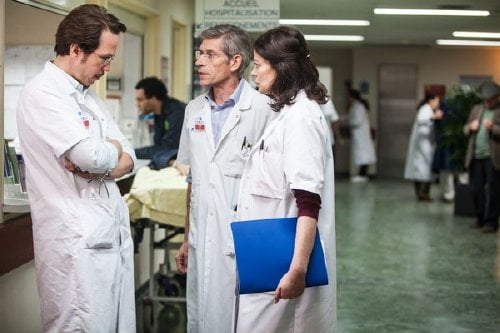Hippocrates: Diary of a French Doctor

Benjamin (Vincent LaCoste) is a bright eyed, brand new intern and is starting his, he knows, illustrious career at his father’s Parisian hospital. He is not expecting the daunting challenge in earning that career and seeks the help of another, but far more experienced, intern, Abdel (Reda Kateb), and we learn about Benjamin’s experiences in “Hippocrates: Diary of a French Doctor.”
Laura's Review: B
Benjamin (Vincent Lacoste, "Eden") faces an uncomfortable reality on his first day as an intern at a Paris hospital - his father, Professor Barrois (Jacques Gamblin, "The Names of Love"), runs his ward. But that doesn't mean he gets automatic respect, as seen by the stained, two sizes two large physician's coat he's supplied, nor will a protective administration resolve his guilt when a patient dies on his watch in "Hippocrates: The Diary of a French Doctor." Cowriter/director Thomas Lilti, who also happens to be a practicing doctor, paints a pretty bleak picture of French health care in this dramedy (France's Government subsidized universal health care was rated close to the best in the world by the WHO in 2000). But if, as he states in the press notes, he wanted to shine a light on the foreign doctors forced to work as interns at low pay rates, he's succeeded. As Algerian physician Abdel, Reda Kateb ("Zero Dark Thirty"), who won a Cesar for this role, gives a study in compassionate care despite a system which often has other priorities. He's the real star of the film. After a humorously overwhelming initiation tour from Denormandy (Marianne Denicourt, "Sade"), Benjamin's left adrift, an unattached cog in a furiously spinning wheel. After a week, though, he tells his dad he thinks he's done OK only to be told he knows nothing yet. That's quickly proven true with his fumbling attempt at a spinal tap. The 'new' new intern, Abdel, takes charge, instructing his much younger colleague. On a night shift, his awkward bedside manner is evident with Mr. Lemoine (Thierry Levaret, "Germinal"), known as 'Tsunami,' a frequent, obviously downtrodden patient. Benjamin tries to order an ECG, but is informed the machine is broken and has been for some time. He gives up and goes to sleep only to discover Lemoine died overnight. He reports the truth to Denormandy only to be told to say, if asked, that he ran the test. Abdel questions, as does Lemoine's wife (Julie Brochen, "Just Before Losing Everything"), a surprise follow-up visitor wanting a cause of death whom Benjamin avoids, referring her to the uncomprehending Abdel. In a hospital whose staff follows "House" episodes, things come to a head involving the treatment of an elderly Stage 4 cancer patient, Mrs Richard (Jeanne Cellard, "Mood Indigo"), who responds to Abdel and his prescribed morphine drip. But Denormandy insists her bed will be occupied for too long and that she should be tube fed in order to gain enough strength to leave. When Abdel defies her orders during a resuscitation attempt, he's sanctioned, a move that will more than likely end his medical career. This is enough to spur the hospital staff to turn on those who lead them and Abdel's honor teaches Benjamin an important lesson, one which spurs him to rectify the case which has been haunting him. With one minor exception (a quick montage which lets us know Benjamin has indulged Abdel's desire to visit the Moulin Rouge), Lilti's film remains set within the hospital's corridors, patient rooms, conference rooms and rooftop, where many of the doctors indulge in smoke breaks. Kateb infuses his doctor with care, compassion and just enough humor while Lacoste is more of a blank slate to be writ upon, just like his intern should be. Cellard is great in a small role, carving out a life in her scant interactions with Abdel, breaking our hearts with her suffering when his approach is overruled. Grade:
Robin's Review: B-
As I watched “Hippocrates” I could not shake the feeling that it has a lot in common, to me, with the old “Dr. Kildare” films from the 30s and 40s, with Lew Ayres as the titular young doctor and Lionel Barrymore as the cantankerous but kind Dr. Gillespie. Whereas those old films always had an upbeat ending, “Hippocrates: Diary of a French Doctor” is a modern look at the French public medical care system through Benjamin’s eyes. It is a sobering look into a bureaucratic system that puts the patients second and the bureaucracy first.

